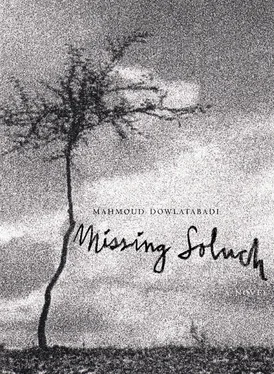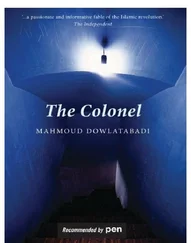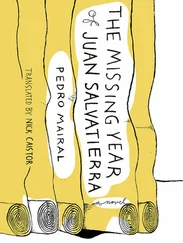Abbas ran to the door. Abrau followed, standing shoulder to shoulder with his brother, and both stared out at the snow that had gathered on the wall around their house, and farther away at what had accumulated on the roofs of Zaminej. They stood transfixed. From a distance, crows were approaching: caw, caw. The brothers wanted to stay home today. The thought made them euphoric. On a day like this, no one would leave Zaminej. An idea entered Abbas’ mind suddenly — gambling! He could arrange a game today. The other children would be idle, gathering at the shop to buy sweets. Sweets with nuts. Then the older ones of them, those with money in their pockets, would quietly sneak to the storeroom to gamble. Recently, Agha Sadegh had brought a pack of playing cards from town. The older ones would play with the cards and the youngsters would play bajal pieces. Since the time he’d brought the playing cards, Agha Sadegh didn’t like them to play with the bajal pieces in his storeroom. The racket it caused interfered with his business. And he didn’t just let anyone into the storeroom.
“What are you doing here, my dear child? You’re still too young!” he would say.
So now the younger children had nowhere to go. It had snowed, and it wasn’t any good trying to play bajal games in some ruins. Someone had to come up with a dry, warm, and empty place. A stable. And what stable better than the empty one by Soluch’s house? Abbas thought that maybe he could snare three or four of these two-bit players and arrange a game or two. And maybe even Ali Genav would join as well.
This thought drew Abbas toward the pantry. He found a tin box containing his bajal pieces under some bric-a-brac and returned to the door of the pantry gleaming. He poured the pieces from the box and gathered two sets of them, one set of three, and another of four. The set of three would be used for the game with three pieces, and the four would be used for the game they called wolf. He wrapped each set inside a handkerchief and hid them under the waistband of his trousers, and then went back into the room.
Abrau was standing before the stove. Mergan was pouring herbs in the kettle while Hajer busied herself with the task of folding up the blankets before coming to her mother’s side. Abbas positioned himself beside Abrau and held his hands over the flames that were choking in a cloud of smoke. The burning wet wood poured smoke and brought tears to their eyes. Because of this, although mother and children had gathered around the stove to warm themselves, they were forced to bid a retreat with eyes tightly shut and noses sniffling. The house was filling with smoke. Abrau fell to his knees, placed his hands on the ground, and began blowing inside the stove. He blew with all his strength, but it wasn’t enough to bring a flame to the wet kindling. Self-loathing and hunger filled him; he felt abject and wretched. He kept trying, but he was unable bring the flame to life. He felt broken. His mouth protruded so that his teeth looked bigger and his lips seemed larger than usual. His trumpet-shaped lips began to darken, and his eyes flickered inside their sockets. Eventually, he lost his breath and fell back. Now Abbas leaned before the stove and directed his breath powerfully toward the source of the smoke in the wet kindling. Now the smoke blew upward, and a tiny flicker of a flame licked at the wood inside the belly of the stove. Mergan told Hajer to bring the cups, and she gathered two clay goblets from the cupboard, placing them before her mother. Mergan then told the girl to bring the oleander seeds. Hajer knew where the oleander was and brought back a small bag. Mergan divided the seeds, apportioning each person two. Then she filled the cups with hot herbal tea from the kettle. Abbas took one cup for himself — the fact that Abbas would take the first sip or bite of each meal had become an accepted fact within the family, regardless of whether they each approved of this or not. He saw it as his right, since he always reached for the food or drink before the others.
Mergan rose and went to the pantry while Abbas and Abrau drank their concoctions. When Mergan returned, Abrau was still looking out the door at the snow.
“I wish we could eat sugar-ice today!”
Mergan brought out a snow shovel and Soluch’s old dirt shovel and placed them by the door, saying, “If you’re men, you’ll go get sugar-ice for us. I’ll get the bread. Here’s a snow shovel, and here’s a shovel. If you clear snow from four roofs, you can buy ten seer of molasses for us.”
Abbas said, “Today we don’t have to go to the fields, but instead we have to shovel snow?”
“I’m saying, go for yourselves. You don’t have to go. Get some fresh air.”
“For one day, we can take a break from gathering wood stalks and you want us to get fresh air?”
Abrau said, “What if I get sick again?”
“You won’t get sick. You’re not a little chickadee, now! You can take my chador and wrap it around your shoulders.”
Abbas said, “What about shoes? You can’t wade into waist-deep snow with tattered shoes! My feet will go black from the cold!”
“So your shoes are good enough for getting up to tomfoolery in the snow, but not for work? Anyway, I’ll wrap your feet up myself, and by the time you get back, I’ll have built up a nice, big fire. The house will be as warm as an oven. What else do you want?”
Abbas said, “Everyone clears their own roof — who would pay to have us shovel their roof for them?”
“Plenty of people! Like the widow of Agha Malek. Who does she have to clear her roof?”
“Her gardener! She has a gardener — Karbalai Habib.”
“You expect Karbalai Habib to be able to shovel snow on a day like this? If you held his nose for a second he’d fall down dead, the poor thing!”
“So if I clear Agha Malek’s house, where will Abrau work?”
“Bibi Abdel’s roof. Abdel’s not around. He’s gone to town to buy a motorized miller. Abrau can clear that roof, and he’ll make a little from that.”
They could come up with no other excuses. Abbas said, “How about our own house? Are we just going to wait until there’s so much snow it collapses?”
Mergan said, “I’m here. I’ll clear our roof myself.”
“With what shovel?”
“Don’t worry about that! Go tend to your own work!”
That was that. Abbas rose and took the snow shovel. Not surprisingly, Abrau was left with the old dirt shovel. This was Abbas’ way, to take the best implement for himself. Despite this, Abrau complained, “Who’s ever seen someone clearing snow with a regular shovel?”
Abbas ignored him. He had already claimed the snow shovel and was now wrapping his feet in rags. Abrau looked up at Mergan, who said, “Any house with a roof should have a snow shovel you can use. Stop complaining; get up and get yourself wrapped up!”
Abrau was not lazy; he was tired. All of a sudden he was tired. His heart wasn’t in the task. His eyes showed his worries about the work ahead; he was even frightened. The cold and the misery of hunger had watered down his enthusiasm, replacing it with disappointment. Uncertain, deep down, he didn’t want to set foot outside the house in this snow! A kind of terror set in and fixed him to the floor of the house. Mergan tossed her night chador next to Abrau and said, “Take that and wrap it around you. Especially around your waist. And take some old rags and wrap up your feet. Don’t nod off there like an opium addict! Let’s go!”
Forlorn, Abrau shook off his paralysis and rose. He had no other choice. He folded his mother’s night chador. Mergan told Hajer, “Take the other end and help him, girl! Why are you just standing there like a stalk of grass?”
Читать дальше












